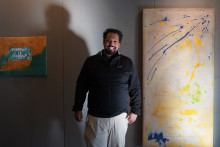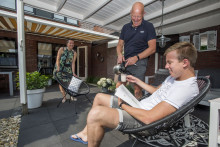Three talented UT researchers will receive a NWO Vidi Grant: Chris Stolk, André ten Elshof and Ron Jansen. Each of them will receive 600,000 euros for the development of their own innovative research over the next five years.
The Vidi Grant is awarded to gifted researchers who have already been doing research at a postgraduate level for several years.
Chris Stolk (31) is a post-doc at IMPACT. Stolk studied Theoretical Physics and Mathematics in Utrecht, where he also earned his PhD. Since August 2004, he has been an assistant professor at the Applied Analysis and Mathematical Physics group in the EEMCS Faculty.
`I am researching seismic reflection,' he explains. `It is a geophysical method for determining the properties of the earth. It is mainly used in the oil industry.'
Stolk plans to use the grant to hire a research assistant and a post-doc. `It can also be used to fund part of my own salary, leaving me more time to do research.' He considers geophysics a challenging area, which allows one to apply mathematics to the real world. `I hope that will not change, because it is very fun and inspiring to work on real-world problems as a mathematician.'
André ten Elshof (36), MESA+ researcher in Inorganic Materials Science, was `thrilled' when early July he heard that his application was accepted by the Netherlands Organization for Scientific Research (NOW). Ten Elshof studied Chemical Technology at the UT and also earned his PhD there. After that, he worked for three years at Akzo Nobel. He became an assistant professor in 2000.
In MESA+, he is currently working on creating nanoparticles with a certain functionality, which can be deployed in a microscopic pattern.
To him, the Vidi Grant offers `a door to many chances and opportunities.' `Everything is open to me now. I want to hire two new PhD students as soon as possible and expand my research.'
Ron Jansen (35) works on the sixth floor of the Hogekamp, at the Systems and Materials for Information Storage group, of MESA+ and EEMCS. Jansen got both a master's and a PhD in Physics in Nijmegen. In 2000 he started working at the UT through the Academy Professorship program of the Royal Netherlands Academy of Arts and Sciences (KNAW), which attempts to retain promising researchers for science. Since 2003 he has been a senior university lecturer.
`My research focuses mainly on the development of a new type of nanoelectronics that uses magnetic materials. These materials are already used in storage, for example in hard discs.'
To him, the Vidi Grant offers a bit of recognition for the work he has been doing with eight research assistants and postgraduate students. In November he will start searching for small magnets with a new PhD student.
Trans. Jeroen Latour







